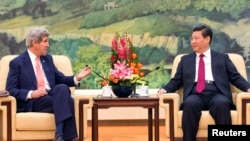BEIJING —
U.S. Secretary of State John Kerry is in Beijing where he met with senior Chinese officials to discuss rival territorial claims in the region, North Korea's nuclear program, and human rights concerns.
Secretary Kerry says he had frank discussions with Chinese leaders about human rights challenges here, again stressing that the United States believes the free exchange of information contributes to national strength.
"Recent arrests of peaceful advocates for reform run counter, in our judgment, to all of our best interest and the ability to make long-term progress," he said. "I emphasized today that the United States remains concerned about the human rights situation here in China, especially with respect to the Tibetan and Uighur areas."
Kerry told reporters that it is important for Washington and Beijing to manage their differences as there are so many issues on which they work. In talks with Chinese President Xi Jinping, State Councilor Yang Jiechi and Foreign Minister Wang Yi, Kerry says they discussed the war in Syria, efforts to limit Iran's nuclear program, and the challenges of both climate change and clean energy.
North Korea
On North Korea, Kerry is calling on China to do more to get the government in Pyongyang to comply with international nuclear inspections. And he says Chinese leaders assured him they share the goal of a denuclearized Korean peninsula.
"They made it very clear that if the North doesn't comply and come to the table and be serious about talks and stop its program and live up to an agreed upon set of standards with respect to current activities that are threatening to people, that they are prepared to take additional steps in order to make sure that their policy is implemented," he said.
Kerry says China has a "unique and critical role" on North Korea as it is the country's principle supplier of both fuel and banking services.
Easing maritime tensions
On this trip to Asia, Kerry is also working to ease tensions over rival territorial claims in the East China Sea, in the Sea of Japan, and in the South China Sea. China's introduction of an air defense zone around islands claimed by both Beijing and Tokyo has raised concerns that China may do the same in the South China Sea where Vietnam, the Philippines and Malaysia have rival claims.
Kerry says he told Chinese leaders that the United States hopes all future actions regarding these disputes will be open, transparent, and inclusive.
"We've made it very clear that a unilateral, unannounced, unprocessed initiative like that can be very challenging to certain people in the region and therefore to regional stability. And we urge our friends in China to adhere to the highest standards of notice, engagement, involvement, information sharing in order to reduce any possibilities of misinterpretation," he said.
Kerry says Chinese leaders believe they have a strong claim to the contested waters based on history. But he says they told him they agree that all competing claims should be decided according to international law.
Secretary Kerry says he had frank discussions with Chinese leaders about human rights challenges here, again stressing that the United States believes the free exchange of information contributes to national strength.
"Recent arrests of peaceful advocates for reform run counter, in our judgment, to all of our best interest and the ability to make long-term progress," he said. "I emphasized today that the United States remains concerned about the human rights situation here in China, especially with respect to the Tibetan and Uighur areas."
Kerry told reporters that it is important for Washington and Beijing to manage their differences as there are so many issues on which they work. In talks with Chinese President Xi Jinping, State Councilor Yang Jiechi and Foreign Minister Wang Yi, Kerry says they discussed the war in Syria, efforts to limit Iran's nuclear program, and the challenges of both climate change and clean energy.
North Korea
On North Korea, Kerry is calling on China to do more to get the government in Pyongyang to comply with international nuclear inspections. And he says Chinese leaders assured him they share the goal of a denuclearized Korean peninsula.
"They made it very clear that if the North doesn't comply and come to the table and be serious about talks and stop its program and live up to an agreed upon set of standards with respect to current activities that are threatening to people, that they are prepared to take additional steps in order to make sure that their policy is implemented," he said.
Kerry says China has a "unique and critical role" on North Korea as it is the country's principle supplier of both fuel and banking services.
Easing maritime tensions
On this trip to Asia, Kerry is also working to ease tensions over rival territorial claims in the East China Sea, in the Sea of Japan, and in the South China Sea. China's introduction of an air defense zone around islands claimed by both Beijing and Tokyo has raised concerns that China may do the same in the South China Sea where Vietnam, the Philippines and Malaysia have rival claims.
Kerry says he told Chinese leaders that the United States hopes all future actions regarding these disputes will be open, transparent, and inclusive.
"We've made it very clear that a unilateral, unannounced, unprocessed initiative like that can be very challenging to certain people in the region and therefore to regional stability. And we urge our friends in China to adhere to the highest standards of notice, engagement, involvement, information sharing in order to reduce any possibilities of misinterpretation," he said.
Kerry says Chinese leaders believe they have a strong claim to the contested waters based on history. But he says they told him they agree that all competing claims should be decided according to international law.




